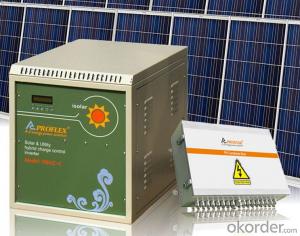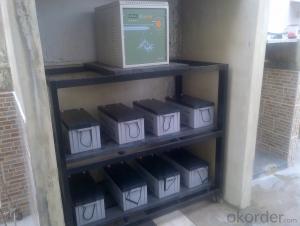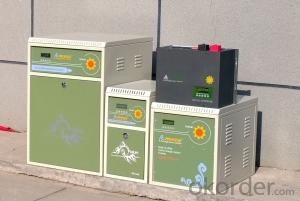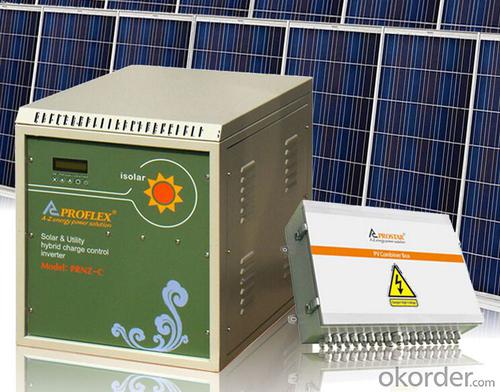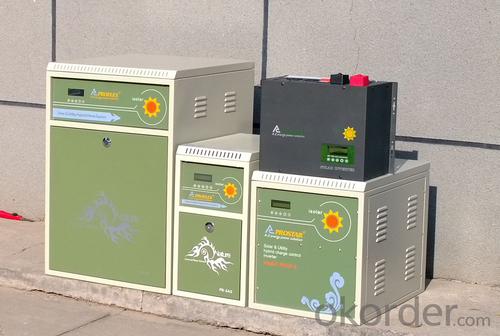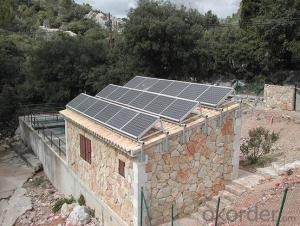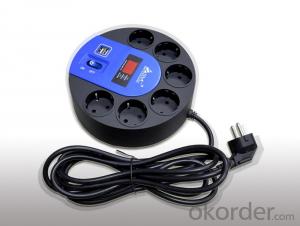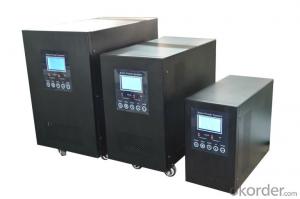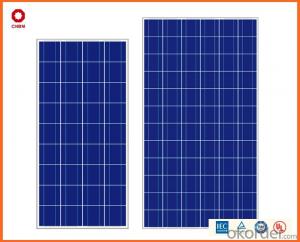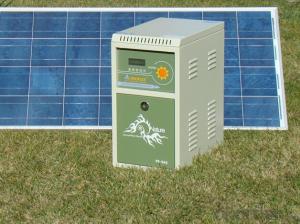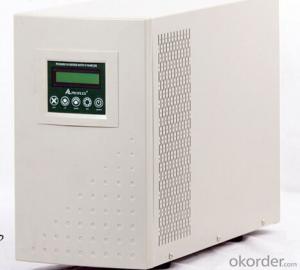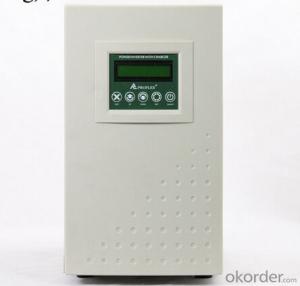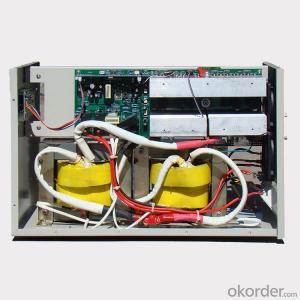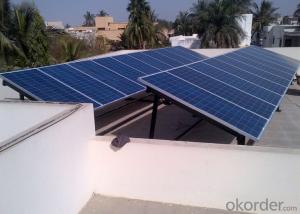Solarcity Solar Energy Systems - Sun Power Off Grid System 300W Design Backup Time 5-6hrs
- Loading Port:
- Tianjin
- Payment Terms:
- TT OR LC
- Min Order Qty:
- 10 unit
- Supply Capability:
- 10000 unit/month
OKorder Service Pledge
OKorder Financial Service
You Might Also Like
Specification
Sun power off grid system
Design Backup Time 5-6Hrs | |||
Solar Module | Maximum power at STC(pm) | 150W solar panel(polycrystalline) 2pcs 75W,2pcs parallel | |
Max.system charging voltage | 17.6V | ||
Max.system charging current | 8.54A | ||
Inverter | Output waveform | Low frequency pure sine wave | |
Continuous output power | 300W | ||
Output voltage/frequency | 220V/50HZ | ||
Charge controller | Syetem voltage | 12V | |
Rated discharge current | 15A | ||
Cabinet | Material | Steel box of zinc-plated and laquer-coated | |
Battery | Type | Deep cycle | |
System voltage | 12V | ||
capacity | 1pcs 12V 100Ah | ||
operating temperature | -20℃-+55℃ | ||
Packing(CBM/KG) | Solar panel | 0.06CBM/20KGS | |
Control box | 0.11CBM/15KGS | ||
Battery | 0.02CBM/31KGS | ||
Whole system | 0.19CBM/66KGS | ||
Daily use reference | |||
Name of load | Power | Working hours | Consumption |
TV | 70W | 4hours | 280Wh |
LAPTOP | 60W | 2hours | 120Wh |
LIGHTING | 30W | 6hours | 180Wh |
FAN | 50W | 6hours | 300Wh |
TOTAL | 210W | 880Wh | |
Daily use reference
TV 70W x 4 hours
Lighting 30W x 6 hours
Fan 50W x 6 hours
Laptop 60W x 2 hours
Total loading power: 210W
Total power consumption per day: 880Wh (0.88kWh/day)
AC solar power system consists of solar batteries, solar controller, battery, inverter components.
Used to solve rural or remote areas without electricity, such as highland, island, pastoral, villas, border posts and other military and civilian life electricity.
FAQ
1. How do I decide which system is right for me ?
For protection from long outages, include a generator or solar panels in your Must solar system. Shorter outages can be handled by a battery-only system.
2. Where my system will be installed ?
Must solar systems are usually wall-mounted near a home's main electrical (circuit breaker) panel.
3. How do I install my system ?
A solar backup inverter is connected to a home electric system , we will supply detailed installation manual and videos for our customers .
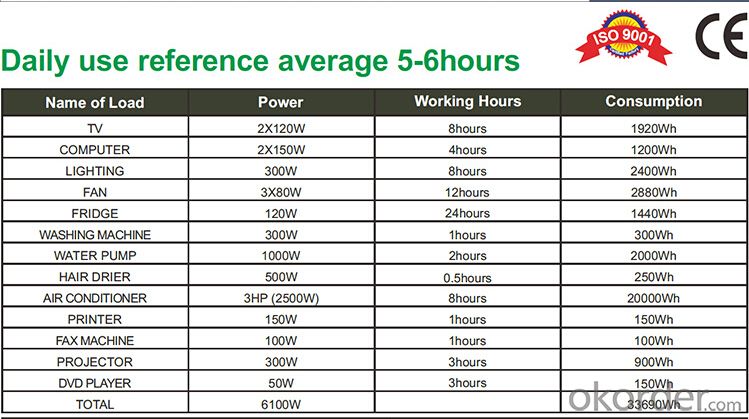

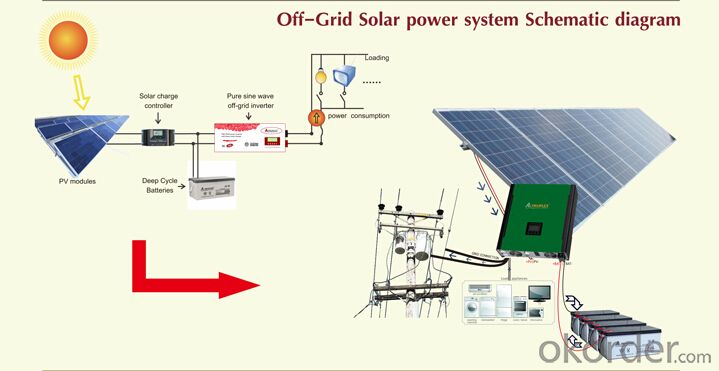
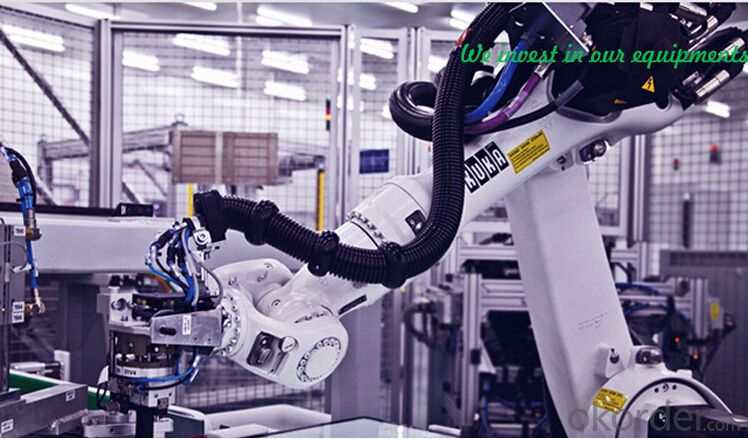
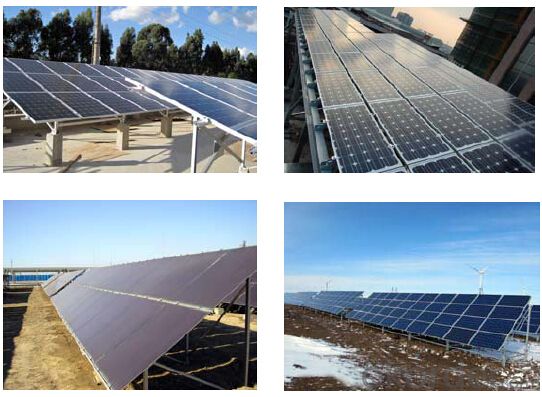


- Q: What is the difference between a solar tracker and a fixed-tilt solar energy system?
- A solar tracker is a system that follows the movement of the sun throughout the day, adjusting the position of solar panels to maximize sunlight exposure. On the other hand, a fixed-tilt solar energy system consists of solar panels that are mounted at a fixed angle, typically facing south, and do not move throughout the day. The main difference lies in their ability to track the sun's movement, resulting in increased energy production for solar trackers compared to fixed-tilt systems.
- Q: Can solar energy systems be used in powering street cameras or surveillance systems?
- Yes, solar energy systems can be used to power street cameras or surveillance systems. Solar energy is a sustainable and renewable source of power that can provide a reliable and independent energy supply for street cameras and surveillance systems. By installing solar panels on rooftops or mounting them on poles near the cameras, the panels can capture sunlight and convert it into electricity. This generated electricity can then be stored in batteries, which can be used to power the cameras and surveillance systems even during periods of low sunlight or at night. Using solar energy for street cameras and surveillance systems not only reduces the reliance on traditional power sources but also helps in reducing carbon emissions and minimizing the overall environmental impact. Additionally, solar-powered systems can be cost-effective in the long run as they eliminate the need for expensive cabling and provide a self-sustaining energy solution. Overall, solar energy systems are an excellent choice for powering street cameras and surveillance systems, offering numerous benefits such as sustainability, reliability, cost-efficiency, and environmental friendliness.
- Q: Are there any risks of electrical surges or voltage fluctuations with solar energy systems?
- Yes, there are potential risks of electrical surges or voltage fluctuations with solar energy systems. These risks can be caused by factors such as lightning strikes, grid disturbances, or faults in the solar panels or inverters. However, modern solar energy systems are equipped with protective measures, such as surge protectors and voltage regulators, to minimize these risks and ensure the safe and efficient operation of the system. Regular maintenance and inspections are also important to identify and address any potential issues that may arise.
- Q: How do solar energy systems impact job creation?
- Solar energy systems have a positive impact on job creation as they require skilled professionals for installation, maintenance, and operation. This industry's growth has led to the creation of various job opportunities, particularly in manufacturing, engineering, construction, and project management. Additionally, the widespread adoption of solar energy stimulates local economies, attracting investments and driving the need for more skilled workers, contributing to overall job creation.
- Q: Can solar energy systems be used for powering off-grid medical clinics?
- Yes, solar energy systems can be used to power off-grid medical clinics. Solar panels can provide a reliable and sustainable source of electricity to run essential medical equipment, lighting, and other critical infrastructure in remote areas where grid connections are unavailable or unreliable. This can greatly enhance healthcare services and improve access to medical care in underserved communities.
- Q: Can solar energy systems be used for powering healthcare facilities?
- Yes, solar energy systems can definitely be used to power healthcare facilities. Solar panels can generate electricity to run medical equipment, lighting, and heating or cooling systems in hospitals, clinics, and other healthcare facilities. This renewable energy source is not only environmentally friendly but also reliable and cost-effective in the long run, making it a suitable option for powering healthcare facilities, especially in areas with limited access to the electrical grid.
- Q: Can solar energy systems be used in areas with limited access to solar batteries?
- Yes, solar energy systems can still be used in areas with limited access to solar batteries. In such cases, the solar energy generated during the day can be directly consumed or stored temporarily in alternative energy storage systems like capacitors or flywheels. These systems can be used to power devices or provide electricity during periods of low or no sunlight, ensuring a continuous and reliable energy supply even without solar batteries.
- Q: Can solar energy systems be used in military applications?
- Yes, solar energy systems can be used in military applications. Solar technology has proven to be highly adaptable and reliable, making it an attractive option for military operations. The military has recognized the benefits of solar energy systems in terms of reducing dependence on fossil fuels and improving energy security in remote or volatile regions. One of the key advantages of solar energy systems in military applications is their portability. Solar panels and related equipment can be easily transported and deployed in various locations, providing power for small-scale operations or even entire bases. This flexibility allows military units to operate in off-grid or austere environments where traditional energy sources may be scarce or unreliable. Solar energy systems can also enhance the sustainability and resilience of military operations. By generating renewable energy on-site, the military can reduce its carbon footprint and decrease reliance on vulnerable supply chains for fuel. Solar power can be integrated with energy storage solutions to ensure continuous power supply, even during grid outages or in combat situations. Furthermore, solar energy systems contribute to cost savings in the long run. While the initial investment may be higher compared to conventional energy sources, solar technology has become increasingly affordable. Over time, the operational and maintenance costs of solar systems are significantly lower than those of conventional energy sources. This can result in substantial savings for the military, allowing resources to be allocated to other critical areas. In addition to these benefits, solar energy systems also offer enhanced tactical advantages. Solar-powered equipment and devices can operate silently, reducing the risk of detection by enemy forces. Furthermore, solar energy systems can reduce the logistical burden of transporting and storing traditional energy sources, allowing military units to be more agile and efficient in their operations. Overall, solar energy systems offer numerous advantages for military applications. The technology's versatility, portability, sustainability, cost-effectiveness, and tactical benefits make it a valuable asset in enhancing military capabilities while reducing environmental impact and improving energy security.
- Q: Are there any ongoing monitoring requirements for solar energy systems?
- Yes, there are ongoing monitoring requirements for solar energy systems. Monitoring is essential to ensure that the solar energy system is operating efficiently and effectively. It helps in identifying any potential issues or malfunctions, allowing for timely repairs or maintenance. Ongoing monitoring typically involves tracking the system's performance, including energy production, system uptime, and any deviations from expected outputs. This can be done through various monitoring tools and technologies, such as real-time monitoring software, data loggers, or remote monitoring systems. Additionally, some jurisdictions or incentive programs may have specific monitoring requirements to ensure compliance with regulations or eligibility criteria. Regular monitoring helps maximize the benefits of solar energy systems and ensures their long-term performance and durability.
- Q: What is the lifespan of solar batteries?
- The lifespan of solar batteries can vary depending on several factors. Generally, high-quality solar batteries can last anywhere from 5 to 15 years. However, with proper maintenance and care, some batteries have been known to last up to 20 years or more. The lifespan of solar batteries is influenced by factors such as the type and quality of the battery, the depth of discharge (how much energy is used before recharging), the frequency of charging and discharging cycles, and the overall maintenance of the battery system. It's important to note that over time, the capacity of solar batteries may decrease, resulting in reduced energy storage capabilities. This gradual decline in capacity is known as battery degradation. While it is an inevitable process, proper care and maintenance can help slow down the rate of degradation. Regularly monitoring the battery's state of charge, avoiding deep discharges, and ensuring proper ventilation and temperature control can all contribute to prolonging the lifespan of solar batteries. Additionally, following the manufacturer's guidelines for maintenance and replacement can help maximize their longevity. Overall, investing in high-quality solar batteries, coupled with proactive maintenance, can significantly extend their lifespan, providing reliable and sustainable energy storage for your solar power system.
Send your message to us
Solarcity Solar Energy Systems - Sun Power Off Grid System 300W Design Backup Time 5-6hrs
- Loading Port:
- Tianjin
- Payment Terms:
- TT OR LC
- Min Order Qty:
- 10 unit
- Supply Capability:
- 10000 unit/month
OKorder Service Pledge
OKorder Financial Service
Similar products
Hot products
Hot Searches
Related keywords
